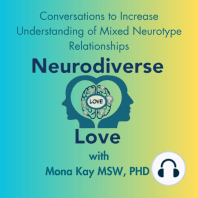53 min listen

Discovering Unknown Neurodiversity Changed Our Marriage Forever-Brooke Ward
Discovering Unknown Neurodiversity Changed Our Marriage Forever-Brooke Ward
ratings:
Length:
81 minutes
Released:
Sep 12, 2023
Format:
Podcast episode
Description
During this episode, Brooke Ward, LMFT shares the challenges she and her husband experienced before learning they were in a mixed neurotype marriage. When Brooke was diagnosed with ADHD she began to do some individual work to better understand her neurotype, however she soon realized that her husband might also benefit from better understanding his neurology. That process led him to discovering that he is AuDHD and has Sensory Processing Disorder. Brooke shares her lived experiences and the ways in which trauma and unknown neurodiversity impacted her marriage. She shares about some of the major misunderstandings that occurred and what led her to believe that the root cause may be neurological differences.
In this episode we discuss lots of important issues including:
Co-dependency.
Feeling alone and like you are being taking advantage of.
Being a creature of habit.
Lack of communication or being angry and emotional.
Feeling abandoned when your partner is focused on their deep interest.
Sensory issues with an infant.
Changes to routine after having a child.
Dysregulation and emotional communication.
Creating structure and routines for parenting.
Change can be like working with play-doh or titanium.
ADHD and impulsivity and instant gratification.
Motivation, capacity and the ability to see things differently.
Unmasking and changing careers.
Understanding sensory sensitivities and the benefits of earbuds and comfortable clothes.
Increased ability to repair after conflict.
Memory loss after emotional dysregulation.
Understanding your partner may not always be able to show up for your emotionally.
Abuse is abuse no matter what your neurotype is.
Understanding reactions that are not appropriate to the situation.
Lack of awareness and education on Autism, ADHD and neurodiversity in universities that are training helping professionals.
Stigma, shame, stereotypes create challenges...we need a paradigm shift!
Patience, awareness, capacity, motivation, accountability, and shifting your internal views.
Letting go of unrealistic expectations and hope of what you thought your relationships would be.
Understanding that there will be grief.
You can contact Brooke @ https://www.psychologytoday.com/us/therapists/brooke-lalone-ward-webster-ny/724919
If you are experiencing domestic violence in your relationship and you live in the United States you can call the National Domestic Violence hotline at: 800-799-7233. If you are in the United Kingdom you can call: 0808-2000-247.
___________________________________________________________________________________________________________________________________
If you would like to buy a digital deck of the Neurodiverse Love Conversation Cards or get more information about the support groups that Mona facilitates for neurodiverse couples, or the neurotypical/non-autistic partners, check out her website at: www.neurodiverse love.com, or send her an email at: neurodiverselove4u@gmail.com
---
Send in a voice message: https://podcasters.spotify.com/pod/show/neurodiverse-love/message
In this episode we discuss lots of important issues including:
Co-dependency.
Feeling alone and like you are being taking advantage of.
Being a creature of habit.
Lack of communication or being angry and emotional.
Feeling abandoned when your partner is focused on their deep interest.
Sensory issues with an infant.
Changes to routine after having a child.
Dysregulation and emotional communication.
Creating structure and routines for parenting.
Change can be like working with play-doh or titanium.
ADHD and impulsivity and instant gratification.
Motivation, capacity and the ability to see things differently.
Unmasking and changing careers.
Understanding sensory sensitivities and the benefits of earbuds and comfortable clothes.
Increased ability to repair after conflict.
Memory loss after emotional dysregulation.
Understanding your partner may not always be able to show up for your emotionally.
Abuse is abuse no matter what your neurotype is.
Understanding reactions that are not appropriate to the situation.
Lack of awareness and education on Autism, ADHD and neurodiversity in universities that are training helping professionals.
Stigma, shame, stereotypes create challenges...we need a paradigm shift!
Patience, awareness, capacity, motivation, accountability, and shifting your internal views.
Letting go of unrealistic expectations and hope of what you thought your relationships would be.
Understanding that there will be grief.
You can contact Brooke @ https://www.psychologytoday.com/us/therapists/brooke-lalone-ward-webster-ny/724919
If you are experiencing domestic violence in your relationship and you live in the United States you can call the National Domestic Violence hotline at: 800-799-7233. If you are in the United Kingdom you can call: 0808-2000-247.
___________________________________________________________________________________________________________________________________
If you would like to buy a digital deck of the Neurodiverse Love Conversation Cards or get more information about the support groups that Mona facilitates for neurodiverse couples, or the neurotypical/non-autistic partners, check out her website at: www.neurodiverse love.com, or send her an email at: neurodiverselove4u@gmail.com
---
Send in a voice message: https://podcasters.spotify.com/pod/show/neurodiverse-love/message
Released:
Sep 12, 2023
Format:
Podcast episode
Titles in the series (100)
The Value of an ASD Diagnosis & the Impact of Knowing on Our Love Relationships by Neurodiverse Love with Mona Kay